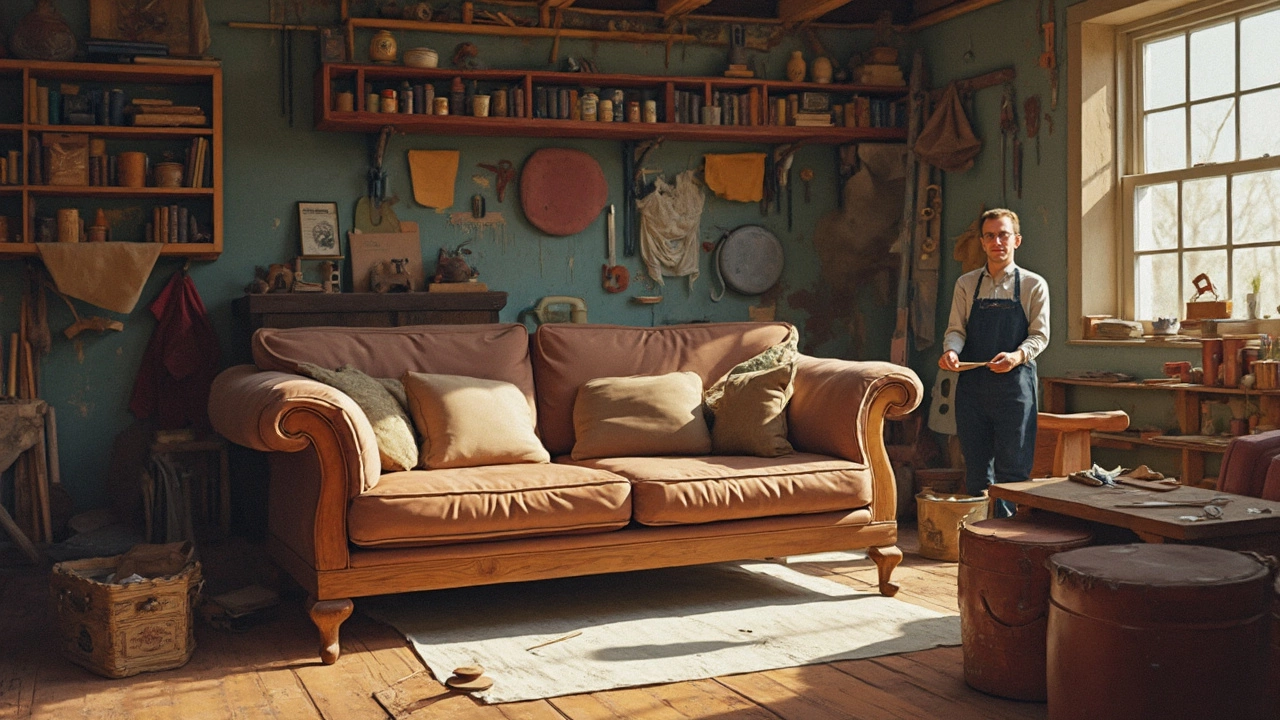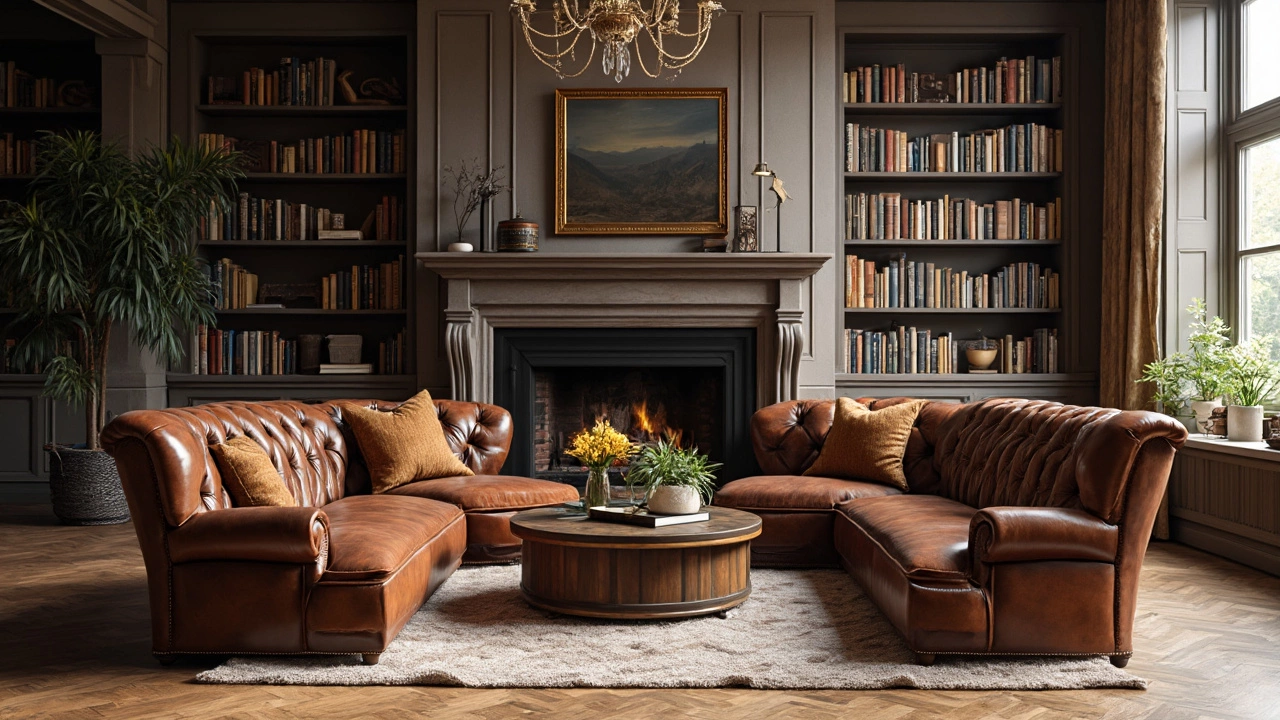If you've ever found yourself staring at a three-seater and wondering if a heftier price tag means it'll survive longer than your last budget buy, you're not alone. Let's face it, couches are the communal heart of any home. They're the nap spot, the gathering place, and sometimes the pet's personal playground.
The big question is whether it's worth investing in a more expensive piece. It's not just about looks or brand names. We're talking about materials, how it's put together, and even the sneaky things like warranty that signal lasting power. Sure, a designer couch looks pretty sleek, but does it stand the test of time against comfy, yet budget-friendly options?
Understanding what goes into the price — beyond just a brand logo — can help figure out what you're really paying for. We'll break down what's behind the price tags, with the goal of seeing if they correlate with actual endurance. Because when you're ready to sink into the couch after a long day, the last thing you want to worry about is if it's going to hold up.
- The Price vs. Quality Debate
- Materials Matter
- Construction and Craftsmanship
- Brand Reputation and Value
- Tips for Choosing a Durable Couch
- Common Mistakes to Avoid
The Price vs. Quality Debate
Diving into the whole price vs. quality discussion with couches, it's easy to assume that spending more guarantees a sofa that will outlive your marathon Netflix sessions. But is that actually the case? While you might think that more expensive couches automatically mean better quality, that's not always the story.
The price tag doesn't just reflect the cost of materials or craftsmanship. It often includes brand prestige and even marketing costs. Imagine buying a couch and realizing you've paid a premium for an iconic logo stamped on it. That's not to say brands don't matter. Renowned companies often guarantee a certain standard, but whether that standard translates directly to longevity is debatable.
So, what should really influence your decision? It’s more about understanding what makes a couch sturdy and durable. More affordable couches can sometimes surprise you with their quality if they're made from decent materials and crafted well. Let's talk real examples: natural hardwood frames and high-density foam might not sound as exciting as streaming features, but they play a huge role in lifespan.
Here's a quick snapshot:
| Feature | Budget Couch | Expensive Couch |
|---|---|---|
| Frame Material | Plywood | Hardwood |
| Cushion Fill | Polyester Fiber | High-Density Foam |
| Upholstery | Synthetic | Leather/Wool |
As you can see, the construction materials can be a more reliable indicator than the sticker price. Realistically, not everyone is looking to own a couch forever. Sometimes, it's about finding the balance between budget and how long you expect to use it. Next time you're in the showroom, ask about the skeleton (a.k.a. frame) of your future nap place instead of just the fluff.
Materials Matter
When it comes to how long a couch will last, the materials used are pretty much the make-or-break factor. You might think leather will always outlast fabric, but it's actually a bit more nuanced than that. Expensive couches often boast materials that not only look good but are tough against daily wear and tear.
Let's talk fabric first. For everyday family use, performance fabrics have become a big trend. These are specially designed to withstand stains, moisture, and the general chaos of life. Think of them as a suit of armor for your couch. You might notice these fabrics often feature words like 'microfiber' or 'polyester-blend.' They're not the only option, but they're up there for durability.
Then there's leather — a classic for a reason. However, not all leather is created equal. Genuine leather is your best bet for something that'll last decades, while faux leather might give you that sleek look, but could start peeling faster than you'd like. A good leather couch is an investment in sturdiness, but you really need to look at what type of leather it is.
When we consider wood, hard woods like oak or maple can significantly enhance the lifespan of a couch. Soft woods might look okay on day one, but they're more prone to nicks and dents over time.
"The choice of materials plays a crucial role in how long furniture will last," says Tom Peters, a renowned furniture designer from Birmingham. "It's always worth checking what you're really paying for."
Check out this quick rundown of what to consider:
- Fabric: Look for terms like 'high performance' or 'woven tightly'.
- Leather: Genuine leather offers the greatest durability.
- Wood: Hard woods make for longer-lasting frames.
So, next time you're shopping, give the materials a second thought. They might just be the difference between a couch that lasts two years versus two decades.
Construction and Craftsmanship
Alright, let's dive into what makes a couch really stand out: it's all in the nuts and bolts, or should I say, the wood and nails! The essence of a sofa's durability is its frame. Most high-quality sofas are built with hardwood frames, like oak or maple, which are designed to withstand years of plopping down and jumping around. Contrast this with cheaper options that might use particleboard or plastic, which are fine until you sit on them 1,000 times.
Then there's the seating foundation — the springs. Sinuous springs are common, but the true champions are 8-way hand-tied springs. Sure, it sounds fancy, but this kind of craftsmanship ensures your couch won't turn into a saggy disaster after a few family movie nights. Yes, it's more labor-intensive, but when done right, it's like having a mattress in your couch. Who doesn’t love good support?
Let’s not forget the cushions. The density of the foam is crucial. You want something that’s comfy but won’t end up looking like a pancake after a few months. A foam density of at least 1.8 pounds per cubic foot is considered good for longevity. High-resilience foam is even more resilient, bouncing back into shape and offering a luxurious feel.
The little details matter too. Upholstery materials and even the stitching quality have a role in the sofa set quality. Look for double stitching or the type of fabric that promises to endure both cat claws and coffee spills.
In a world where cheaper often means a shortcut here or there, knowing these details can really tip the scale when choosing your next expensive couch. You're not just buying a seat; you're investing in a trusty companion for your living room adventures.

Brand Reputation and Value
When you're forking out a chunk of change for a couch, knowing who you're buying from can make all the difference. A brand's reputation often speaks volumes about the quality of their sofa sets. Companies that have been around for a while, like IKEA or Ashley Furniture, have built trust over the years, not just through their marketing but through consistent product quality.
Brands often associated with more expensive couches usually boast about superior craftsmanship. This can mean anything from using high-quality materials to having rigorous quality checks. For example, manufacturers like Restoration Hardware are known for their commitment to sourcing durable materials and ensuring each piece is built to last.
However, it's important to do your homework. Check out reviews online, not just on the company’s website but on independent sites too. This can give you a better picture of customer satisfaction and potential issues. Remember that a hefty price tag often includes what we might call 'brand tax' — the cost that comes simply from the brand name itself.
| Brand | Known For | Customer Satisfaction |
|---|---|---|
| West Elm | Modern Design | High |
| La-Z-Boy | Comfort | Very High |
| Pottery Barn | Classic Styles | High |
Beyond just reputation, look at the value of what you're buying. Does the couch come with a solid warranty? Does the brand offer after-sales service? These often overlooked details can provide peace of mind and save you from spending more in the long run. So, while choosing a brand, balance the urge to splurge with the practical aspects of your future cozy throne.
Tips for Choosing a Durable Couch
Found the perfect spot in your living room but worried about finding a couch that'll survive the wear and tear of everyday life? Picking a durable couch isn't just about picking something that looks good now; it's about making sure it stays that way for years to come.
Start by looking at the frame. Hardwood frames like oak or maple are heavy-duty compared to pine or particleboard. The joints matter too—look for corner blocks or dowels instead of just staples and glue. A solid frame sets the foundation for anything you throw at it, whether it’s kids, pets, or just life.
"Your choice in couch materials largely influences longevity." – Home Décor Magazine
For upholstery, leather and tightly woven fabrics are your best bets. Leather ages gracefully while tough fabrics resist stains and pilling. Check the rub count on fabric swatches—the higher the count, the more resilient it is.
- Check the cushions: High-density foam cushions wrapped with a layer of fiber or down will retain their shape for longer.
- Don’t ignore the springs: Look for sinuous or serpentine springs—they’re less likely to sag compared to easier-to-install alternatives.
- Mind the maintenance: Some materials require regular upkeep. Know what you're signing up for.
Investing a little extra time or even a few pounds now can save a lot of hassle later. Expensive couches can offer great quality, but remember it's all about knowing what to check under the hood. And of course, always ask about the warranty—it often reflects the manufacturer's confidence in their product.
Getting the right mix of these elements ensures your money goes toward something that stands the test of time. After all, a good couch is more than just a seat; it’s where stories unfold.
Common Mistakes to Avoid
When you're out on the hunt for that perfect couch, it’s easy to get swept up in the excitement and make choices you might regret later. So, let's make sure you avoid some typical blunders people fall into when picking out their next sofa set.
First off, don’t overlook the importance of measuring your space. You'd be surprised how many folks end up with a gorgeous couch that just won't fit through their door or swallows up their living room. Always have your room dimensions and entryways checked before falling in love with a piece.
Next, pay attention to the materials. A couch made of high-quality leather or tough fabric might seem pricier at first, but it could save you in the long run with fewer replacements or repairs. And speaking of durability, don't just go for what looks good. Make sure you check underneath the hood, if you will. A solid frame — think hardwood or metal — usually means it's built to last.
- Avoid skimping on quality: It might seem like you're saving a few quid now, but cheaper couches often lead to quicker wear and tear, costing more in the long run.
- Don't forget about comfort: Some elegant-looking sofas are actually quite uncomfortable. Test it out in the showroom as you would at home; sit, lie down, move around.
- Be cautious with trends: Trendy pieces might be tempting, but classic styles usually prove more timeless. You don't want to be stuck with a dated look after a year.
- Overlooking warranties: Choose brands offering solid warranties, signaling they're confident in their product’s longevity.
Another key mistake is not considering your lifestyle. Got kids or pets? Light-colored fabrics or delicate materials might not be the best choice. Opt for something stain-resistant or easy to clean.
Finally, don't underestimate the importance of actually


Write a comment